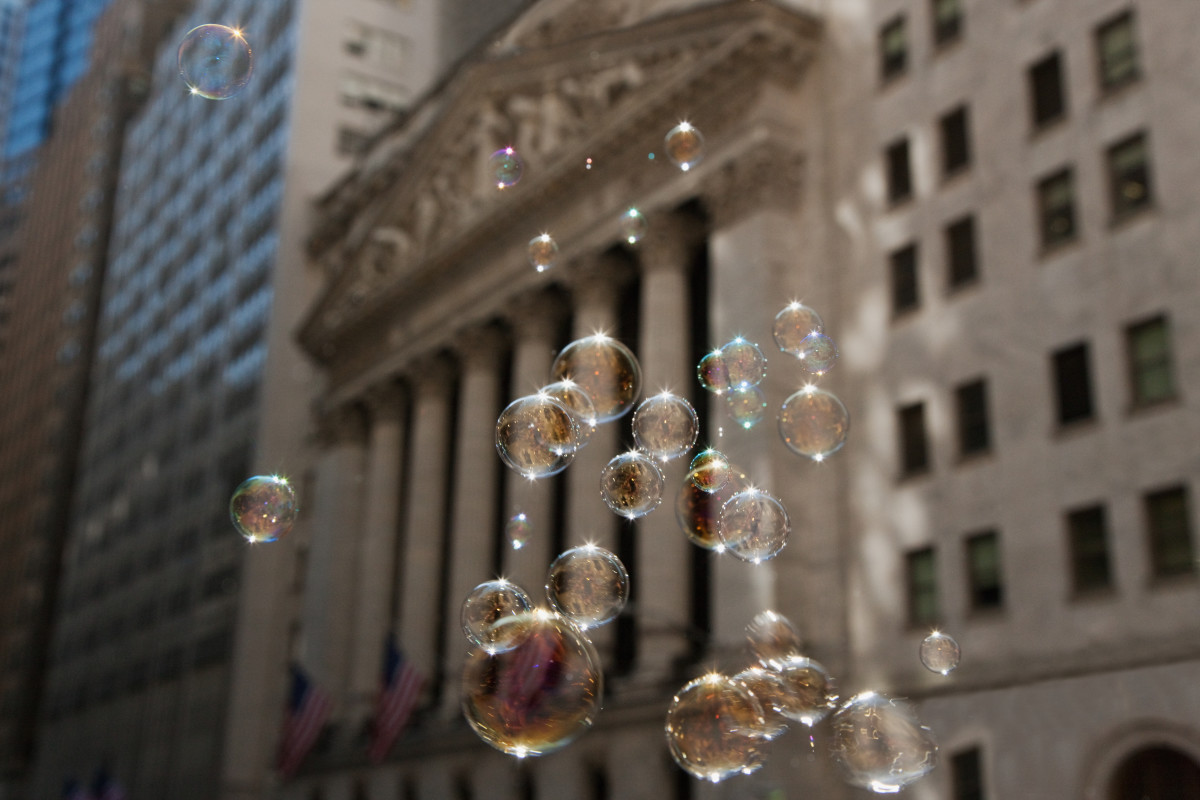
Fast Facts
- AI hype has pushed tech valuations into the stratosphere over the past year in the early stages of what some have deemed the 'AI bubble.'
- TheStreet sat down with Ari Newman, co-founder of venture capital firm Massive, to discuss his AI investment strategy in the midst of AI washing and investor hysteria.
- He said that eventually, AI companies will have to start making money. How they might do so is a 'terrifying' prospect to consider.
A veritable tsunami of hype around artificial intelligence has spent the past year pushing the valuations of both private and public tech firms ever higher.
Shares of Nvidia (NVDA) , the AI chipmaker that has been deemed the "picks and shovels of the AI gold rush," have more than tripled since this time last year. Microsoft (MSFT) , all on the back of investor excitement around its explorations in AI, has added about $1 trillion to its market cap over the past year.
And that's just two of the leading publicly traded AI firms.
Related: Researcher has a warning about the future of the AI boom
AI startups have also been absorbing funds at a quick rate; The Information reported Tuesday that French startup Mistral is in talks to raise funds at a $5 billion valuation. This comes just a few months after the company raised $415 million at a $2 billion valuation in December.
OpenAI, the Microsoft-funded startup behind ChatGPT, has a valuation of around $80 billion. Anthropic is valued at around $18 billion.
In 2023, $50 billion of venture capital made its way to AI startups, according to Cruncbase data, a significant slice of the $285 billion that was invested in startups last year.
Google, according to Bloomberg, plans to invest more than $100 billion "over time" in AI. And Goldman Sachs CEO David Solomon said on Monday's earnings call that the opportunity for AI investment represents a "level of scale that is candidly unprecedented."
But even as valuations continue to soar, the cracks are beginning to become more obvious. Venture capital firm Sequoia recently found that in 2023, AI firms collectively spent $50 billion on Nvidia chips alone. They brought in only $3 billion in revenue.
A recent survey conducted by PagerDuty found that the vast majority of executives have security concerns related to AI, and have paused internal AI initiatives until these concerns can be resolved.
AI researcher and cognitive scientist Gary Marcus has said that the industry is dealing with a simple, core problem: hallucinations — when an AI model confidently generates false information — make models unreliable; that unreliability makes them non-viable for corporate use-cases, which results in an enormously expensive software that can't seem to generate much in the way of revenue.
Ari Newman, co-founder and managing director of venture capital firm Massive, likewise thinks that "we're in a bubble." The challenge, he said, is figuring out where in the bubble we are, and how to identify sources of value that might survive a burst.
Related: How one deepfake revenge porn victim is changing the system
VC says the AI bubble is here
"We could very well be in the very beginning" of a bubble, Newman told TheStreet, adding that it might be "a bubble on top of a bubble."
The reason he thinks it will burst eventually comes from his understanding of the cryptocurrency and dot-com bubbles.
"Part of what drives the bubble is various players in that ecosystem becoming each other's customers. We had banks, we had chains, we had exchanges, we had service providers, marketing firms ... the entire ecosystem was propping itself up," he said. "We're going to run into the exact same thing" with AI.
At some point, Newman said, these companies that have gained such enormous valuations will need to figure out how to turn a profit.
"We have venture-fueled hysteria making access to this really expensive technology dirt cheap," he said. "Eventually, when this bubble bursts, it will be because the ecosystem has to become sustainable and profitable."
The question of how these companies will then attempt to turn a profit is one that, to Newman is "terrifying" to consider.
Right now, he said, we interact with an internet that has become monetized through advertising efforts to be manipulative. Algorithmic feeds return results designed to keep users on platforms longer so they can view more ads (which are tailored to each individual user).
"Imagine if the response from generative AI is manipulated to monetize what you see," Newman said. "No one's thinking about (this) yet. It's literally game over."
He said that hallucinations may well be a problem, but the idea of ad-supported generative AI is a far larger one.
"We already as a society are hanging on by a thread around what truth is," he said. "What happens when the computers are feeding you alternative facts?"
Related: Marc Andreessen defends Silicon Valley in bold, tech-loving manifesto
Navigating the bubble
Despite the risks of that environment, and despite the current AI-generated harms of mass misinformation, deepfake abuse, algorithmic bias, etc., Newman believes that we have yet to "scratch the surface" of the benefits. His hope is that we can tolerate and mitigate the harms and risks enough to get to a point where humanity can begin to experience the benefits, such as rapid drug discovery.
With his eye on that more hopeful horizon, his framework for investing in AI companies is first predicated on a simple understanding of whether a company is using AI for enhancements, or whether a company has AI deeply incorporated into its offerings.
"If I turn the AI off," he said, "what does the product do?"
If a product is essentially non-functional without the AI component, then you have an "AI native" company worth exploring. That process then of exploring possible viability, to Newman, isn't all that complex.
"Is this AI native? Okay, is this unique? Is there a moat you can build around that? Yes or no," he said. "If it's AI-enabled, can anyone else do this too? Does this new technology fundamentally change or unlock something?"
The issue at the core of this bubble, according to Newman, is an environment where investors are getting sold on strong pitches. But at the end of the day, companies still need a real, usable product that will generate actual revenue.
"That's how we look at it, which is, just be careful and make sure that there's a core value prop underwriting the technology itself," he said.
Contact Ian with tips and AI stories via email, ian.krietzberg@thearenagroup.net, or Signal 732-804-1223.
Related: A whole new world: Cybersecurity expert calls out the breaking of online trust







